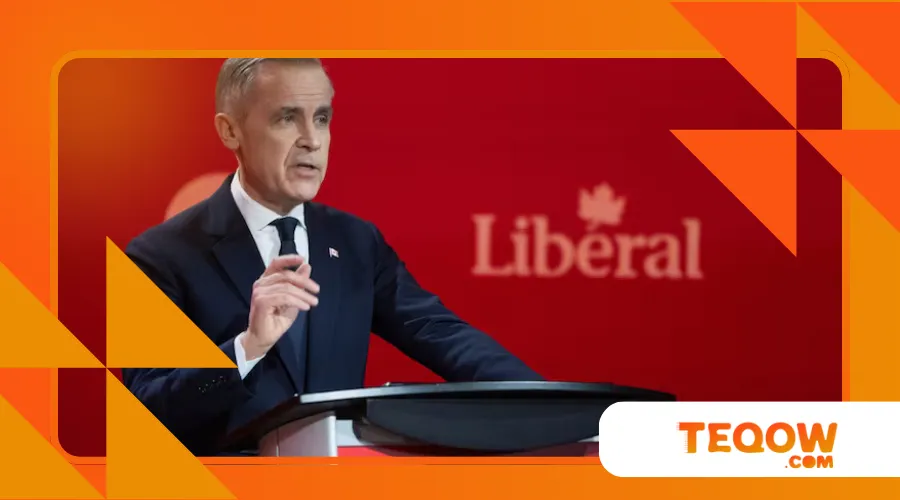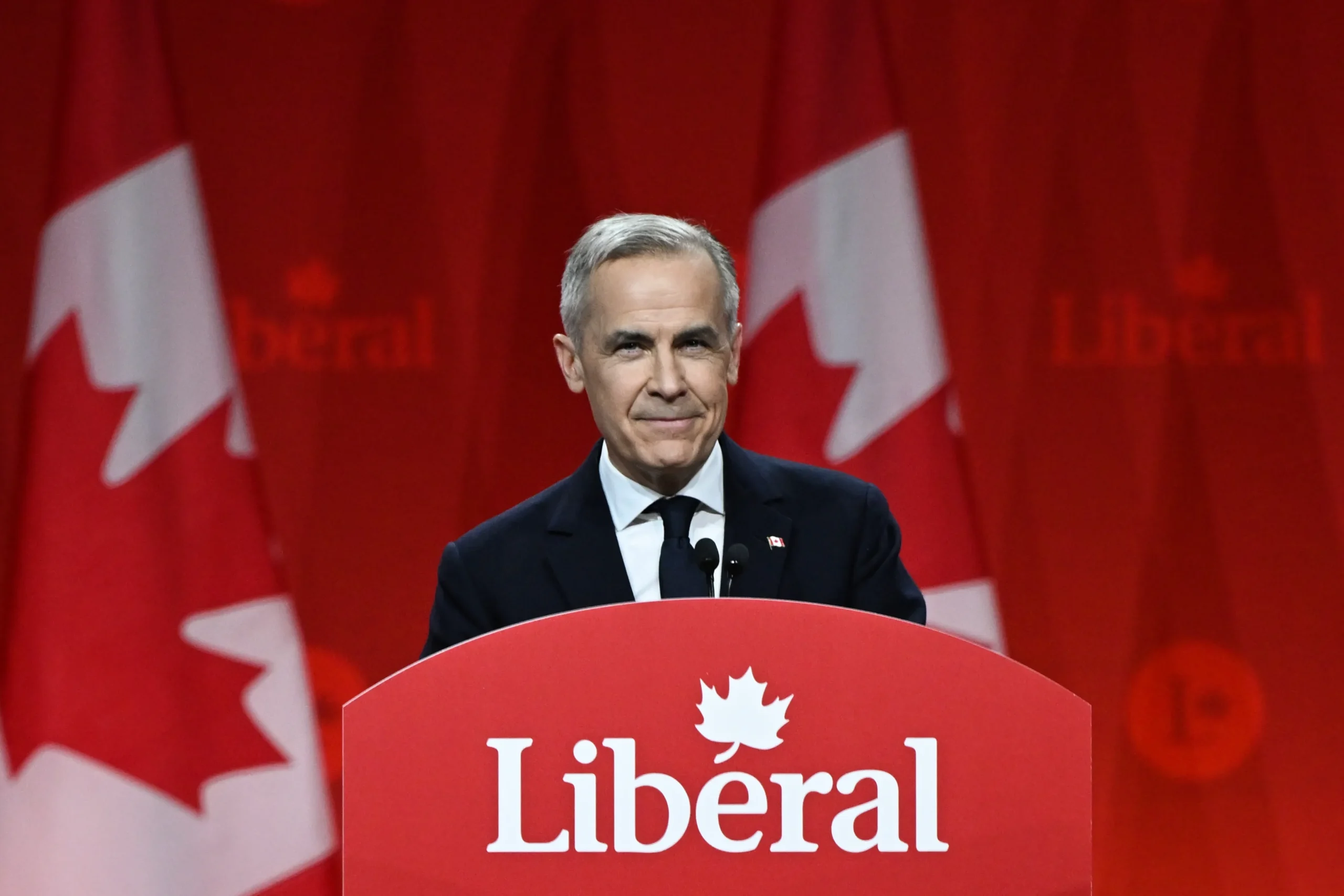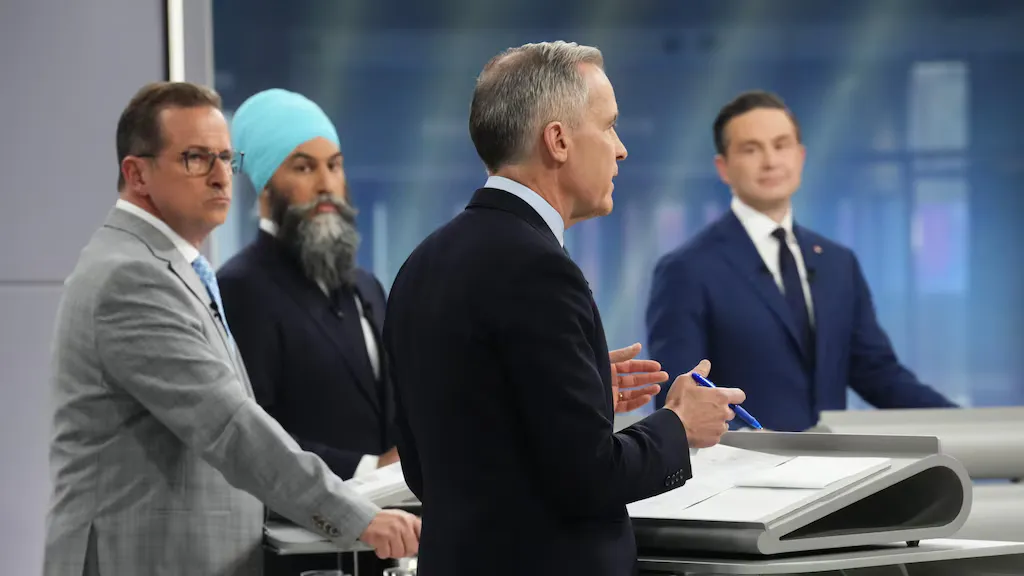Liberal Leader Mark Carney Faces Questions Over Trump’s “51st State” Comments

In the crucible of Canada’s 2025 federal election, Liberal Leader Mark Carney faces questions about his handling of U.S. President Donald Trump’s provocative suggestion that Canada could become America’s “51st state.”
The remark, made during a March 28 phone call, has ignited a firestorm of debate, thrusting Carney into a delicate balancing act: projecting strength against external pressures while navigating domestic political rivalries.
As the election nears, this controversy underscores deeper questions about Canada’s sovereignty, economic resilience, and Carney’s leadership mettle.
How will he steer the nation through this storm?
The stakes are high, not just for Carney but for the entire Canadian political landscape.
With rising tensions between the U.S. and Canada, voters are increasingly concerned about their national identity and autonomy.
This moment could define Carney’s legacy, as he must navigate these turbulent waters with skill and foresight.
The Context: Trump’s Provocation and Carney’s Response
Trump’s “51st state” comment wasn’t a one-off quip.
Since his re-election, he has repeatedly floated the idea, rattling Canadian leaders and stirring patriotic fervor across the country.
According to a CTV News report, Carney confirmed the remark during a campaign stop in Port Moody, B.C., on April 24, 2025, but insisted Trump respected Canada’s sovereignty.
This acknowledgment came after initial reluctance, raising eyebrows among voters and opponents who question his transparency.
Carney’s initial description of the March 28 call as “cordial” omitted Trump’s provocative rhetoric, a choice that NDP Leader Jagmeet Singh seized upon, accusing Carney of not being “totally straight up” with Canadians.
The fallout from this has been significant, with many voters feeling uncertain about Carney’s ability to handle international relations effectively.
His subsequent clarification, focusing on trade negotiations rather than the contentious remarks, has left some feeling that he is prioritizing diplomacy over honesty.
Consider this analogy: Carney’s approach resembles a chess grandmaster facing an unpredictable opponent.
Trump’s erratic moves—tariffs, taunts, and territorial musings—force Carney to anticipate multiple scenarios while maintaining a composed front.
Misjudge a move, and Canada risks economic checkmate.
The question isn’t just about Carney’s response to Trump but whether he can inspire confidence in a nation wary of external domination.
The Political Fallout: A Double-Edged Sword
Liberal Leader Mark Carney faces questions not only from the media but also from rival party leaders who see the Trump controversy as a wedge to undermine his campaign.
Conservative Leader Pierre Poilievre has framed Carney as an extension of Justin Trudeau’s legacy, arguing that a decade of Liberal policies weakened Canada’s economic leverage against the U.S.
In a Halifax press conference on April 24, 2025, Poilievre questioned Carney’s judgment, suggesting his initial downplaying of Trump’s remark reflects naivety or complicity.
Meanwhile, Bloc Québécois Leader Yves-François Blanchet has leveraged the issue to rally Quebec voters, framing Trump’s comments as an affront to Canadian identity.
Even in Quebec, where separatist sentiments linger, a BBC report noted that voters expressed a desire for leaders who can “stand up to Trump.”
This nationalist surge has unexpectedly bolstered Carney’s Liberals, with polls showing a lead in Quebec despite his faltering French.
| Party | Quebec Poll Support (April 2025) | Change Since March 2025 |
|---|---|---|
| Liberal Party | 42% | +12% |
| Conservative Party | 28% | -5% |
| Bloc Québécois | 20% | -7% |
| NDP | 8% | Stable |
Source: 338Canada Poll Aggregator, April 2025
+ Election Campaigns Sideline Climate Debate Amid Cost-of-Living Crisis
The table above illustrates the Liberals’ surprising gains in Quebec, a province critical to securing a parliamentary majority.
Yet, these gains come with a caveat: Carney’s lead hinges on his ability to project strength without alienating voters wary of escalating tensions with the U.S.
As the political landscape shifts, Carney must navigate these complexities carefully, ensuring he addresses both national pride and economic concerns.
Moreover, the perception of his leadership style will play a crucial role in shaping voter sentiment leading up to the election.

Economic Stakes: Navigating Trump’s Trade War
Trump’s tariffs, imposed shortly after his re-election, have exacerbated economic uncertainty, with $2.6 billion in daily cross-border trade at risk.
Carney has proposed targeted counter-tariffs to minimize damage to Canada while maximizing pressure on the U.S. economy, a shift from earlier “dollar-for-dollar” retaliation plans.
This strategy reflects a pragmatic acknowledgment of the U.S.’s economic dominance—its GDP is over ten times Canada’s, per World Bank data.
Carney’s economic credentials as former Bank of Canada and Bank of England governor lend weight to his approach.
During a Montreal debate on April 17, 2025, he emphasized his experience navigating the 2008 financial crisis and Brexit, positioning himself as a steady hand.
But critics argue his globalist background makes him overly cautious, potentially compromising Canada’s interests in trade negotiations.
Imagine a small business owner, like Sarah, a fictional Ontario maple syrup exporter.
Her U.S. market, which accounts for 60% of her sales, faces 25% tariffs, squeezing margins and threatening layoffs.
Sarah wants a leader who can negotiate exemptions or retaliate strategically, not one distracted by diplomatic niceties.
Carney’s promise of a “right deal” post-election offers hope but lacks specifics, leaving voters like Sarah anxious.
This uncertainty reflects broader concerns about economic stability and the long-term impact of Trump’s policies on Canadian businesses.
As the election approaches, Carney must articulate a clear economic vision that reassures voters and addresses their fears.
Transparency and Trust: A Leadership Test
Liberal Leader Mark Carney faces questions about trust, particularly after his delayed disclosure of Trump’s “51st state” remark.
A 338Canada poll from April 2025 found that 54% of Canadians believe Carney should have been more forthcoming about the call, with 32% saying it impacts their trust in his leadership.
This statistic underscores a broader challenge: in an era of heightened skepticism, partial truths can erode credibility.
Carney’s defense—that he prioritized the call’s productive outcome—has merit but risks appearing evasive.
Contrast this with a hypothetical scenario: if Poilievre had received the same call, his populist instincts might have led him to publicize Trump’s remark immediately, rallying voters with fiery rhetoric.
Carney’s measured approach, while diplomatic, lacks the visceral appeal that sways undecided voters.
Why should Canadians trust a leader who filters uncomfortable truths?
This rhetorical question cuts to the heart of Carney’s challenge.
His technocratic style, while reassuring to some, can feel detached to others, especially when national pride is at stake.
To rebuild trust, Carney must blend transparency with a compelling vision for Canada’s future.
Engaging with voters through town halls and direct communication could help bridge this gap and foster a sense of connection.
Ultimately, the success of his campaign may hinge on his ability to resonate emotionally with the electorate.
The Nationalism Surge: An Unexpected Ally
Trump’s rhetoric has inadvertently fueled Canadian nationalism, a dynamic Carney has harnessed to his advantage.
From boycotts of American goods to rallies chanting “Canada First,” the public mood has shifted toward defiance.
In a speech east of Toronto on April 19, 2025, Carney declared, “Canada is not America, and it never will be,” promising C$30.9 billion in defense spending to bolster sovereignty.
This nationalist wave has reshaped the electoral landscape.
The Liberals, once trailing Conservatives by 24 points in January 2025, now lead by 6 points, per CBC News polls.
++ Poilievre Proposes Tougher Sentences for Multiple Murders
The table below highlights the national polling trends:
| Party | National Poll Support (April 2025) | Change Since January 2025 |
|---|---|---|
| Liberal Party | 38% | +18% |
| Conservative Party | 32% | -6% |
| NDP | 8% | -2% |
| Bloc Québécois | 6% | -1% |
Source: CBC News Poll Aggregator, April 2025
The Liberals’ resurgence reflects a public craving for stability amid Trump’s disruptions.
Carney’s pledge to meet NATO’s 2% GDP defense target by 2030, two years ahead of schedule, appeals to voters prioritizing security.
Yet, his opponents argue this reactive nationalism distracts from domestic issues like housing and inflation, which Poilievre has hammered relentlessly.
As the election approaches, Carney must balance nationalistic sentiments with practical solutions to pressing domestic challenges.
Engaging with diverse communities and addressing their specific concerns will be crucial to maintaining support.

Strategic Implications: Carney’s Path Forward
Liberal Leader Mark Carney faces questions about his strategic vision as the April 28 election looms.
His campaign has leaned heavily on anti-Trump sentiment, but this risks oversimplifying Canada’s challenges.
Economic diversification, energy independence, and Arctic security—key pillars of his platform—require long-term commitment beyond election-cycle rhetoric.
Take the case of Elena, a fictional Calgary engineer working in renewables.
She worries that Carney’s focus on counter-tariffs neglects investments in green energy exports, which could reduce reliance on U.S. markets.
Elena represents a growing cohort of voters who demand forward-thinking policies, not just defensive posturing.
Carney’s promise to collaborate with Europe on Arctic security and Indigenous partners on northern infrastructure signals ambition, but execution remains untested.
His ability to pivot from reacting to Trump to proactively shaping Canada’s future will define his legacy.
His debate performances, while substantive, lack the populist flair of Poilievre or the regional resonance of Blanchet.
To secure a majority, he must connect emotionally with voters, translating his global expertise into relatable solutions.
This connection will be vital as Canadians look for leaders who can navigate the complexities of a changing world.
Reference: CTV News, April 24, 2025
Conclusion: A Defining Moment
Liberal Leader Mark Carney faces questions that test not only his political acumen but also Canada’s resolve in an uncertain world.
Trump’s “51st state” comments, while inflammatory, have gifted Carney an opportunity to rally Canadians around shared identity and purpose.
Yet, the path forward demands more than patriotic soundbites—it requires transparency, strategic foresight, and an unwavering commitment to sovereignty.
As the election draws near, Carney stands at a crossroads.
Will he emerge as the steady hand guiding Canada through Trump’s tempest, or will his cautious diplomacy falter under scrutiny?
The answer lies in his ability to blend conviction with clarity, proving that Canada can thrive, not just survive, in the shadow of its southern neighbor.
With 54% of Canadians seeking greater candor, per 338Canada, Carney’s next moves will shape not only his campaign but the nation’s trajectory.
As voters head to the polls, they will be looking for a leader who can inspire confidence and a sense of unity in these turbulent times.
The stakes are high, and the outcome of this election could redefine Canada’s future on the global stage.
